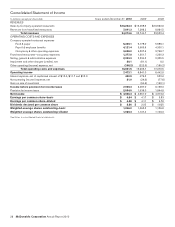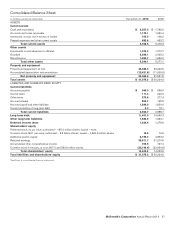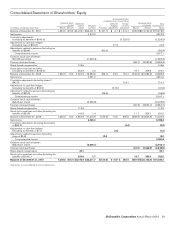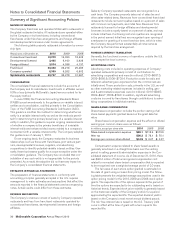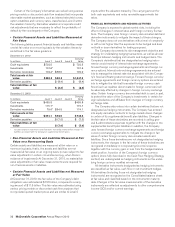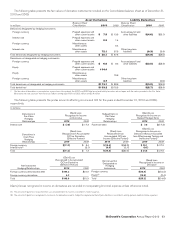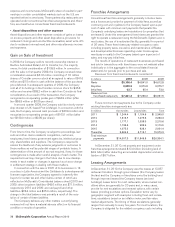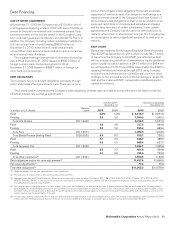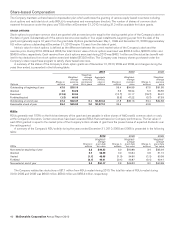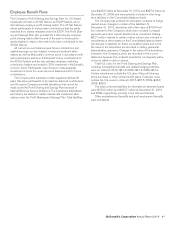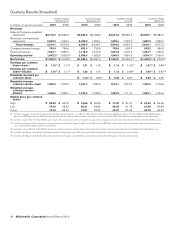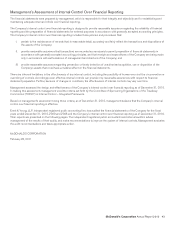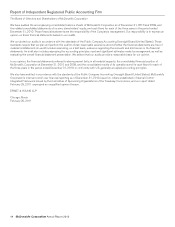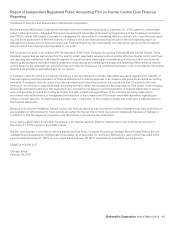McDonalds 2010 Annual Report Download - page 38
Download and view the complete annual report
Please find page 38 of the 2010 McDonalds annual report below. You can navigate through the pages in the report by either clicking on the pages listed below, or by using the keyword search tool below to find specific information within the annual report.
expense and income taxes. McDonald’s share of results for part-
nerships in certain consolidated markets such as the U.S. are
reported before income taxes. These partnership restaurants are
operated under conventional franchise arrangements and, there-
fore, are classified as conventional franchised restaurants.
• Asset dispositions and other expense
Asset dispositions and other expense consists of gains or losses
on excess property and other asset dispositions, provisions for
restaurant closings and uncollectible receivables, asset write-offs
due to restaurant reinvestment, and other miscellaneous income
and expenses.
Gain on Sale of Investment
In 2009, the Company sold its minority ownership interest in
Redbox Automated Retail, LLC to Coinstar, Inc., the majority
owner, for total consideration of $139.8 million. In connection
with the sale, in first quarter 2009, the Company received initial
consideration valued at $51.6 million consisting of 1.5 million
shares of Coinstar common stock at an agreed to value of $41.6
million and $10 million in cash with the balance of the purchase
price deferred. In subsequent quarters of 2009, the Company
sold all of its holdings in the Coinstar common stock for $46.8
million and received $88.2 million in cash from Coinstar as final
consideration. As a result of the transaction, the Company
recognized a nonoperating pretax gain of $94.9 million (after
tax–$58.8 million or $0.05 per share).
In second quarter 2008, the Company sold its minority owner-
ship interest in U.K.-based Pret A Manger. In connection with the
sale, the Company received cash proceeds of $229.4 million and
recognized a nonoperating pretax gain of $160.1 million (after
tax–$109.0 million or $0.09 per share).
Contingencies
From time to time, the Company is subject to proceedings, law-
suits and other claims related to competitors, customers,
employees, franchisees, government agencies, intellectual prop-
erty, shareholders and suppliers. The Company is required to
assess the likelihood of any adverse judgments or outcomes to
these matters as well as potential ranges of probable losses. A
determination of the amount of accrual required, if any, for these
contingencies is made after careful analysis of each matter. The
required accrual may change in the future due to new develop-
ments in each matter or changes in approach such as a change
in settlement strategy in dealing with these matters.
In connection with the sale in 2007 of its businesses in 18
countries in Latin America and the Caribbean to a developmental
licensee organization, the Company agreed to indemnify the
buyers for certain tax and other claims, certain of which are
reflected on McDonald’s Consolidated balance sheet (2010 and
2009: other long-term liabilities–$49.6 million and $71.8 million,
respectively; 2010 and 2009: accrued payroll and other
liabilities–$28.4 million and $25.3 million, respectively). The
change in the total balance was primarily a result of the reso-
lution of certain of these liabilities.
The Company believes any other matters currently being
reviewed will not have a material adverse effect on its financial
condition or results of operation.
Franchise Arrangements
Conventional franchise arrangements generally include a lease
and a license and provide for payment of initial fees, as well as
continuing rent and royalties to the Company based upon a per-
cent of sales with minimum rent payments that parallel the
Company’s underlying leases and escalations (on properties that
are leased). Under this arrangement, franchisees are granted the
right to operate a restaurant using the McDonald’s System and, in
most cases, the use of a restaurant facility, generally for a period
of 20 years. These franchisees pay related occupancy costs
including property taxes, insurance and maintenance. Affiliates
and developmental licensees operating under license agree-
ments pay a royalty to the Company based upon a percent of
sales, and may pay initial fees.
The results of operations of restaurant businesses purchased
and sold in transactions with franchisees were not material either
individually or in the aggregate to the consolidated financial
statements for periods prior to purchase and sale.
Revenues from franchised restaurants consisted of:
In millions 2010 2009 2008
Rents $5,198.4 $4,841.0 $4,612.8
Royalties 2,579.2 2,379.8 2,275.7
Initial fees 63.7 65.4 73.0
Revenues from
franchised restaurants $7,841.3 $7,286.2 $6,961.5
Future minimum rent payments due to the Company under
existing franchise arrangements are:
In millions Owned sites Leased sites Total
2011 $ 1,244.4 $ 1,104.6 $ 2,349.0
2012 1,213.7 1,075.6 2,289.3
2013 1,177.1 1,038.5 2,215.6
2014 1,132.6 986.9 2,119.5
2015 1,075.3 926.1 2,001.4
Thereafter 8,664.2 6,715.1 15,379.3
Total minimum
payments $14,507.3 $11,846.8 $26,354.1
At December 31, 2010, net property and equipment under
franchise arrangements totaled $13.4 billion (including land of
$3.9 billion) after deducting accumulated depreciation and amor-
tization of $6.7 billion.
Leasing Arrangements
At December 31, 2010, the Company was the lessee at 13,957
restaurant locations through ground leases (the Company leases
the land and the Company or franchisee owns the building) and
through improved leases (the Company leases land and
buildings). Lease terms for most restaurants, where market con-
ditions allow, are generally for 20 years and, in many cases,
provide for rent escalations and renewal options, with certain
leases providing purchase options. Escalation terms vary by
geographic segment with examples including fixed-rent escala-
tions, escalations based on an inflation index, and fair-value
market adjustments. The timing of these escalations generally
ranges from annually to every five years. For most locations, the
Company is obligated for the related occupancy costs including
36 McDonald’s Corporation Annual Report 2010


